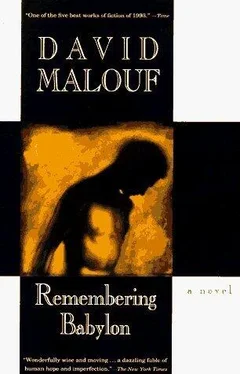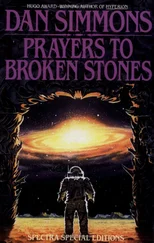In the afternoons after school was out, half a dozen local children, rather ragged and barefoot, the girls and boys both, had been accustomed to come with shoe-boxes under their arms and pick mulberry leaves. They were poor children from one-roomed shacks on Wynnum Road. Their mothers took in washing. Their fathers worked at the abattoirs at Cannon Hills or were labourers on the roads. Sister Monica had let them scramble up high after the tenderest leaves and given them beeswax to chew. When all the sweetness was gone and the wax was white, they would mould it into miniature chairs and tables for their dolls’ houses, and the boys, these days, into tanks, which they brought to show her. ‘Baroom!’ Now they were forbidden the place. In half a dozen houses all along Wynnum Road there was wailing as silkworms starved and fathers set off in search of alternative mulberry trees. Ridiculous, all of it! At the end of the week Lachlan Beattie telephoned again and, on Mother Francis’ suggestion, made his first visit.
They had faced one another on that occasion with a certain shyness. It would have been difficult anyway, after so long. In some ways the ‘circumstances’ made it easier; they could start off with something public between them. She apologised again for having embarrassed him.
‘No, no, you mustn’t,’ he insisted. ‘I’m the one who should apologise. You’re being dragged in my wake — you, poor Goetz. All that has nothing to do with it. Even the war. They don’t care about that. They want my head, that’s all.’ She looked at it. It was fine, familiar. ‘And they’ll get it too, that’s what I’ve come to warn you of — eventually. When it happens,’ he looked amused, ‘you mustn’t think that you were to blame.’
‘But is there nothing you can do?’
‘Yes — I can fight, I’m doing that right now. I’ll give as good as I get. I’m no saint myself when it comes to that sort of thing. But I won’t win. I’ve embarrassed the Government, that’s the real issue. It’s my colleagues who’ll get rid of me … We might as well drop this, you know. I’d rather talk about something cleaner. Your bees, for instance. Let’s talk about your clean little bees.’
‘Cruel little bees,’ she corrected. ‘Oh clean too, yes — but there’s nothing noble about them, or difficult, or unpredictable. That’s why they’re so easy to handle. And Mr Goetz?’
He shook his head.
‘Was he a friend?’
‘No. He’s rather an unattractive fellow really, I don’t quite trust him. The wife is all nerves. Sick, I mean. They’re helpless, hopeless people. Nancy —’ He paused, but she knew who Nancy was — ‘used to go there. She was fond of his Gügelhopf. So really,’ he said, after a little pause — they were running out of steam — ‘that’s the end of it.’
They were walking down to look at her hives, and as they passed through the scrubby orchard he reached up for an apple. ‘May I?’ he asked. ‘Will they mind?’, and pulled one. It was ripe enough but small and misshapen. He slipped it into a pocket.
She showed him her hives, which were not of the usual sort but of glass so that an observer could see through to all that was going on in them, all the events and organised procedures and rituals of another life.
Like one of her children, Alice or Kevin or Ben, who loved to look in and see if they couldn’t catch some bit of information that she might have overlooked (they too were on the track of the Great Secret), he squatted, peered in through the transparent pane, and his face, she saw, had the same puzzled wonder and wide-eyed, dreamy calm that she looked for in the children, being pleased, for a time, to give up the greater study for this lesser and no less touching one.
It was like peering through into the City of God — that is how she thought of it, and how she saw it reflected in them; into the life of little furry-headed angels with a flair for geometry, and some power (this was the great Problem she had set herself) of communicating . The form of it was plainly visible, she knew, each time she came to the glass, but her mind in its human shape could not grasp it, though there had been a moment, long ago, when she had known it, of this she was convinced.
This, all those years ago, was what Mrs Hutchence had led her to. Not by explanation but through example and sympathy, which was why she made no attempt now to tell him what her life was but to let him look into the hive and see.
She would have thought of it once, the many-minded, one-minded swarm, as an angel. She thought of it these days as a machine, which was a change but not a difference. Would he understand any of this? She wanted him to.
That they had, anyway, moved closer, was proved a little later, when they settled for the first time on the seat beside the chessboard, and he took off his jacket, then drew the apple from one pocket and a little penknife from the other. What he spoke of, as she watched him cut and lift out a neat wedge, was his grandson, Willie, who ten months before had been killed in France. The penknife was his. It was of yellowed ivory, with a silver-framed portrait on one side of King Edward, on the other of Alexandra. He had had it as a boy, and it had been with him, still a boy, when he fell, among the contents of his pocket along with Woodbines, a box of matches, and a hard little apple he must have picked in an abandoned orchard, with a single sliver cut from it.
She knew what he was telling and wanted her to see. The boy must just have had time to shut the knife and slip it, along with the apple, into his pocket. Cutting into the hard little foreign fruit, inwards like that, to the core, was the last thing he had done, very solemnly as his grandfather was doing it, before they were called forward. The sour-sweet wafer might still have been in his mouth when he was hit — his last taste of the world, its greenness, along with his warm breath expelled to meet the larger, colder one of the autumn morning, then the rush of blood. She watched the scabbed hands cut another thin slice, watched him chew and swallow.
Each time, after that, she had provided the apple. Nothing was said, except for his surprised ‘ah’ and the slow appraisal. So now, on this fifth occasion, she watched him eat and he told her: ‘It’s to be on Wednesday. I wanted you to know beforehand. They’ll give the usual reasons, poor health, you know, as if I were fair worn oot —’ He smiled at the bit of old Scots. ‘Actually,’ — he looked at her and laughed — ‘I’ve never been fitter.’
He cut another slice of apple. It went into his mouth. He chewed. Then looking up: ‘You know, I wish I’d come ten years ago.’
She caught his eye and was puzzled a moment, then saw what he was thinking. Now how was that? He meant he might have had Willie with him. She would have seen the boy.
But not more clearly, she might have told him, than I see him now.
What he wanted in her mouth was the boy’s name; to hear it spoken aloud, in the world, on another’s lips. Now how did she know that?
What a thing Love is, she thought. And that was the word on her lips, though she did not speak it. Love. What she said was ‘Lachlan’ and took his large paw in her own equally scabbed and freckled one.
He looked startled, she released it, and he sat, his hands in his lap, with the half-eaten apple in one hand and in the other the little knife. There was the sound of his breathing, a little broken, and further off the low, continuous humming of her bees, a note she was always aware of, somewhere, not too far off.
They had moved a long way back now, to a moment that more than once in these last weeks had risen up between them and declared itself, and been turned away. A scorching summer afternoon when the whole landscape around had been in shimmering motion, dissolving, re-forming, and they had stood together, he, Meg and herself — he a little in front, being a boy, a man — while the creature, unrecognised and unnamed as yet, that had launched itself out of the unknown world towards them, that the landscape itself had hurled into their midst, a ragged fragment of itself, or of its history or their own, some part of it that was still to come, had hung there against the pulsing sky as if undecided as yet which way to move, upward in flight into the sun or, as some imbalance in its own body, its heart perhaps, drew it, or the earth, or the power of their gazing, downward to where they stood rooted, its toes meanwhile hooked over the peeled bark of the fence rail, the muscles of its stringy feet tensed, its stick-like arms flailing.
Читать дальше












